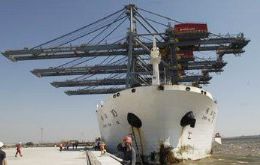MercoPress. South Atlantic News Agency
Uruguay
-
Wednesday, March 10th 2010 - 00:42 UTC
Germany wants “Graf Spee” Nazi eagle displayed in a museum

German Foreign Minister Guido Westerwelle called Tuesday for wreckage from a Nazi-era warship recovered off the coast of Uruguay to be displayed in a museum rather than auctioned to the public.
-
Tuesday, March 9th 2010 - 22:37 UTC
Mujica first overseas trip: Piñera’s inauguration and Bolivia

Uruguayan president Jose Mujica will be present Thursday at the inauguration ceremony of Chilean president-elect Sebastián Piñera and will later travel to Bolivia, his first overseas trip since taking office March first, according to government house sources.
-
Saturday, March 6th 2010 - 11:33 UTC
Mujica will be present at Piñera’s inauguration but not Lula da Silva

Uruguayan president Jose Mujica has confirmed his attendance to the inauguration of Chilean president elect Sebastián Piñera next March 11. However news from Sao Paulo indicates that President Lula da Silva will not be participating at the very austere ceremony to be held in Valparaiso.
-
Tuesday, March 2nd 2010 - 04:26 UTC
Uruguay: Mujica calls for political dialogue and commitment to Mercosur

Jose “Pepe” Mujica, (74) who decades ago served time in prison for taking up arms against Uruguay's “bourgeois state” was sworn in Monday as the country's new president. In his main speech he called for dialogue and regional integration.
-
Tuesday, March 2nd 2010 - 02:24 UTC
Hillary Clinton praises Uruguayan democratic system as “very strong”

United States Secretary of States Hillary Clinton described the Uruguayan democracy as “very strong” and praised the solidity of its political system. Mrs. Clinton was in Montevideo on Monday, for a few hours, representing President Barack Obama in the inauguration ceremony of Uruguayan president Jose Mujica.
-
Monday, March 1st 2010 - 06:00 UTC
Uruguay aims to reduce debt load and boost trade in next five years

Uruguay’s Vice President-elect Danilo Astori said the next government will reduce the country’s debt load and seek to boost trade with the rest of the world in a bid to bolster economic growth.
-
Monday, March 1st 2010 - 05:24 UTC
If Mercosur is failing, “we are doing something wrong”, said Mujica

Uruguay’s president elect Jose Mujica who takes office Monday March first admitted that Mercosur is “failing” because “we are doing something wrong”, but was enthusiastic about Latinamerican integration and praised Argentina, a country where “Uruguayans are not foreigners”.
-
Friday, February 26th 2010 - 06:35 UTC
Mujica praises “strong message” from the US; plans to invite Obama to Uruguay

Uruguayan president elect Jose Mujica will hold a meeting with US Secretary of State Hillary Clinton Monday morning, before the official inauguration, and will take advantage of her presence to invite US President Barack Obama to visit Uruguay.
-
Wednesday, February 24th 2010 - 02:32 UTC
Hillary Clinton at Uruguayan President Mujica’s inauguration

US Secretary of State Hillary Clinton will be visiting five Latinamerican countries next week beginning in Uruguay, representing President Barack Obama at the inauguration ceremony of president elect Jose Mujica on March first, according to Washington diplomatic sources.
-
Tuesday, February 23rd 2010 - 02:18 UTC
IMF suggests Uruguay returns to “fiscal objectives” and creates “energy fund”

The International Monetary Fund, IMF suggested Uruguay should retake its most ambitious “fiscal objectives” in the coming five-year budget to be discussed this year by the new parliament. The emphasis should be in “restricting” outlays since the current level of salary increases for civil service is “not sustainable”.
